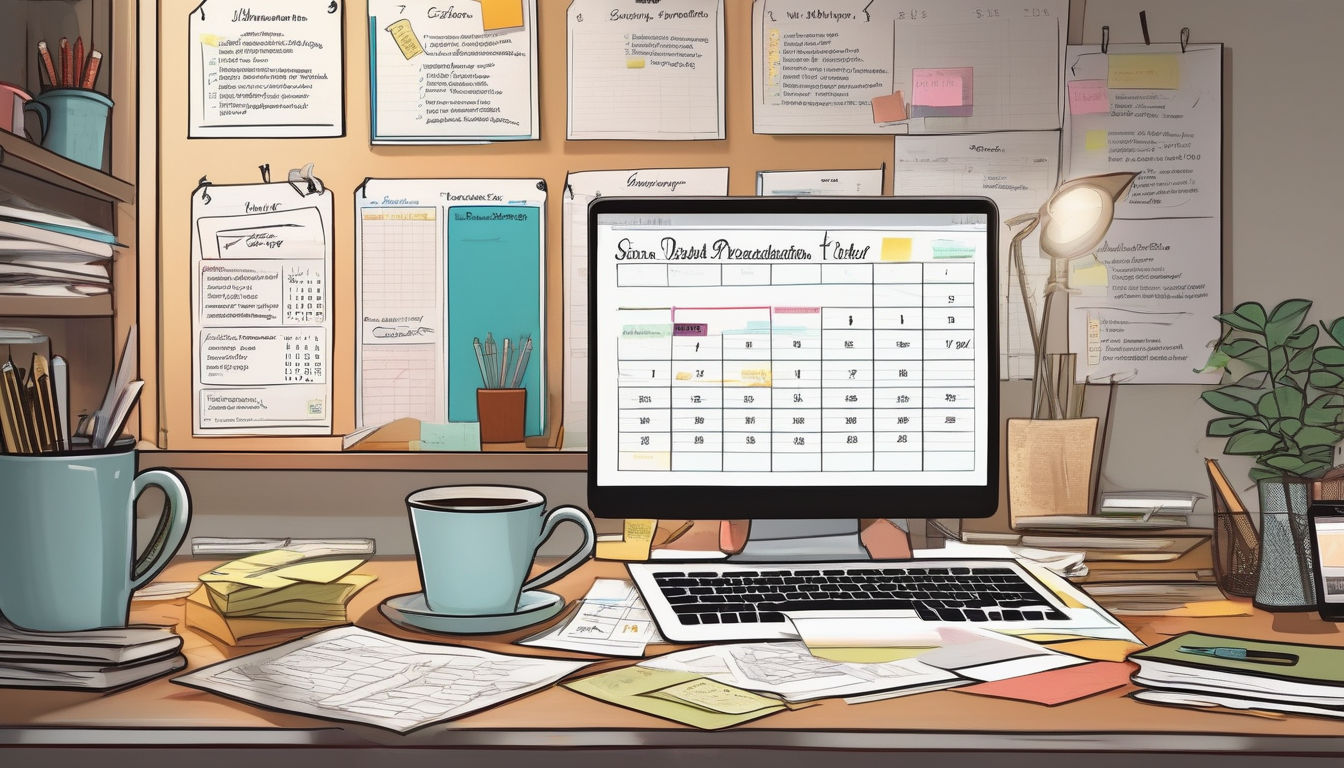The Psychology of Procrastination: Why Do We Delay Tasks?

Have you ever found yourself scrolling through social media instead of tackling that important project? You’re not alone! Procrastination is a common behavior that many people experience, and it can be incredibly frustrating. In essence, procrastination is the act of delaying or postponing tasks, often leading to feelings of guilt or anxiety. But why do we do it? Understanding the psychology behind procrastination is crucial for anyone looking to boost their productivity and live a more fulfilling life.
Procrastination can manifest in various forms, from putting off small chores to avoiding significant life decisions. It’s like a sneaky thief that steals our time and energy without us even realizing it. A recent study found that approximately 20% of adults regularly procrastinate, and this behavior can be linked to deeper psychological factors. So, what drives this tendency to delay tasks? Let’s dive into the underlying causes.
One of the most intriguing aspects of procrastination is its prevalence across different contexts. Whether it’s students avoiding homework, employees delaying reports, or individuals postponing personal goals, the struggle is universal. It’s almost as if procrastination has become a rite of passage in our fast-paced world. The key is to recognize that procrastination isn’t just about poor time management; it often stems from complex emotional and psychological issues.
In the following sections, we’ll explore the psychological factors that contribute to procrastination, including fear of failure, perfectionism, and low self-esteem. By understanding these influences, we can begin to unravel the mystery of why we delay tasks and learn how to combat this behavior effectively. So, are you ready to take a closer look at the psychology of procrastination? Let’s go!

Understanding Procrastination
Procrastination is more than just a habit; it’s a complex behavior that affects countless individuals across various walks of life. At its core, procrastination is the act of delaying or postponing tasks, often to the detriment of our personal and professional lives. You might find yourself putting off a project for work, delaying that important phone call, or even avoiding household chores. Sound familiar? You’re not alone! In fact, studies suggest that approximately 20% of adults identify themselves as chronic procrastinators.
But what does procrastination look like in different contexts? It can manifest in various forms, such as:
- Academic procrastination: Students may delay studying for exams or completing assignments.
- Work-related procrastination: Employees might postpone important tasks or projects, leading to last-minute rushes.
- Personal procrastination: This could involve avoiding chores, neglecting health and fitness goals, or even postponing social engagements.
Understanding the nuances of procrastination is crucial for addressing it effectively. For many, procrastination stems from an internal struggle—an ongoing battle between what we want to do and what we feel we should do. This internal conflict can lead to feelings of guilt, anxiety, and frustration. The irony is that while we may believe we are giving ourselves a break by delaying tasks, procrastination often results in increased stress and decreased overall satisfaction.
Moreover, procrastination can create a vicious cycle. The more we procrastinate, the more we may feel overwhelmed by our responsibilities, leading to further avoidance. It’s like digging a hole; the deeper we go, the harder it becomes to climb out. To break this cycle, it’s essential to recognize that procrastination is not just a simple matter of poor time management. Instead, it often involves deeper psychological factors that need to be addressed.
In summary, procrastination is a multifaceted issue that affects many aspects of our lives. By recognizing its prevalence and understanding its various forms, we can begin to explore the underlying causes and seek effective strategies to combat it. The journey towards overcoming procrastination starts with awareness, and by acknowledging that we struggle with this behavior, we can take the first steps toward a more productive and fulfilling life.

Psychological Factors Behind Procrastination
Procrastination isn’t just about being lazy or disorganized; it’s deeply rooted in our psychology. Understanding the psychological factors that contribute to procrastination can help us unravel the complex web of behaviors that keep us from accomplishing our goals. One of the most significant influences is the fear of failure, which can grip individuals and cause them to avoid tasks altogether. When faced with a daunting project, the thought of not meeting expectations can be paralyzing, leading to a cycle of avoidance and delay.
Another factor that plays a critical role in procrastination is perfectionism. For many, the desire to achieve flawless results can create a mental block. Instead of starting a task, they may spend excessive time planning and preparing, only to find themselves stuck in an endless loop of self-doubt and indecision. This need for perfection often leads to a situation where the fear of making mistakes overshadows the importance of progress. As a result, tasks that could have been completed quickly are postponed indefinitely.
Low self-esteem also contributes significantly to procrastination. Individuals who struggle with self-worth may question their abilities, leading to a lack of confidence when tackling tasks. This can manifest in various ways, such as:
- Avoiding challenging projects
- Delaying important decisions
- Overthinking simple tasks
These behaviors not only hinder productivity but also reinforce negative beliefs about oneself, creating a vicious cycle. When someone continuously puts off tasks, they may feel guilty or ashamed, which can further damage their self-esteem. This relationship between procrastination and self-worth is crucial to understand, as it highlights the importance of addressing underlying psychological issues.
To break free from procrastination, it’s essential to recognize these psychological barriers. By acknowledging the fear of failure, perfectionism, and low self-esteem, individuals can start to challenge these thoughts and behaviors. For instance, practicing self-compassion can help in overcoming the harsh self-judgments that fuel procrastination. Additionally, setting small, achievable goals can provide a sense of accomplishment, gradually building confidence and reducing the urge to delay.
Ultimately, understanding the psychological factors behind procrastination is the first step toward reclaiming control over our time and productivity. By addressing these issues head-on, we can pave the way for a more fulfilling and efficient life.
Fear of Failure
Fear of failure is a powerful emotion that can grip anyone, regardless of age or experience. It’s that nagging feeling in the pit of your stomach that whispers, “What if I mess this up?” This fear often leads to a vicious cycle of avoidance and procrastination. Instead of tackling a project head-on, many find themselves scrolling through social media or binge-watching their favorite shows, all in an effort to escape the daunting task at hand. But why does this happen?
When we let fear take the wheel, it can create a mental block that feels insurmountable. For instance, if you’re working on a big presentation, you might delay starting it because you dread the possibility of not meeting expectations. This is where procrastination becomes a form of self-preservation; you convince yourself that by delaying the task, you’re also avoiding the risk of failure. However, this avoidance only intensifies the fear, leading to a greater sense of anxiety as deadlines loom closer.
Moreover, the impact of fear of failure can extend beyond just the immediate task. It can seep into your self-confidence and overall mental health. When you repeatedly avoid tasks due to fear, you may start to believe that you’re incapable or unworthy. This negative self-talk can create a snowball effect, further diminishing your self-esteem. Over time, the fear of failure can become so overwhelming that it paralyzes you from taking any action at all.
To illustrate this phenomenon, consider the following table that outlines the cycle of fear of failure leading to procrastination:
| Stage | Description |
|---|---|
| 1. Fear of Failure | The initial feeling of anxiety about not succeeding. |
| 2. Avoidance | Choosing to procrastinate instead of facing the fear. |
| 3. Increased Anxiety | As deadlines approach, the anxiety intensifies. |
| 4. Lowered Self-Esteem | Repeated avoidance leads to feelings of inadequacy. |
So, how can we break this cycle? One effective strategy is to acknowledge the fear without letting it dictate your actions. Instead of viewing failure as a catastrophe, try re-framing it as an opportunity for growth. Remember, every successful person has faced setbacks along the way. By embracing the possibility of failure, you can transform it into a powerful motivator rather than a paralyzing fear. This shift in mindset can empower you to take action, even when the outcome is uncertain.
Impact on Self-Confidence
Procrastination doesn’t just affect our productivity; it can deeply impact our self-confidence. When we consistently delay tasks, we often find ourselves caught in a vicious cycle. Each time we put off an important job, we reinforce a belief that we are incapable of completing it, which can lead to feelings of inadequacy. It’s like a snowball effect—one small delay can grow into a mountain of self-doubt.
Imagine standing at the base of that mountain, looking up at all the tasks you’ve avoided. The higher it gets, the more daunting it seems. You start to question your abilities and wonder if you’re ever going to climb that mountain. This is the reality for many who struggle with procrastination. The fear of failure looms large, creating a mental barrier that can feel insurmountable.
Moreover, the relationship between procrastination and self-esteem is significant. When deadlines are missed or tasks are left unfinished, it can lead to a sense of shame or guilt. This negative self-talk can chip away at our confidence. For instance, you might think:
- “I’m never going to get this done.”
- “Why can’t I just be more disciplined?”
- “Everyone else seems to manage their time better than I do.”
These thoughts are not just fleeting; they can become a part of your internal dialogue, leaving you feeling defeated. Over time, this can create a self-fulfilling prophecy where the fear of failure and the habit of procrastination feed into each other, making it increasingly difficult to break free.
However, it’s essential to recognize that overcoming procrastination is possible, and doing so can significantly boost your self-confidence. By taking small steps towards your goals and celebrating those achievements, you can begin to rebuild your self-esteem. Each completed task serves as a reminder that you are capable and competent, helping to dismantle that towering mountain of doubt.
In conclusion, the impact of procrastination on self-confidence is profound. Acknowledging this connection is the first step towards making meaningful changes. By addressing procrastination head-on, you not only improve your productivity but also pave the way for a more confident and fulfilled you.
Overcoming Fear of Failure
Overcoming the fear of failure is a crucial step in breaking the cycle of procrastination. It’s like standing at the edge of a diving board, heart racing, wondering if the water will be cold or if you’ll make a splash. The key is to take that leap, and there are several strategies that can help you do just that. First, it’s important to reframe your mindset about failure. Instead of viewing it as a dead end, consider it a stepping stone. Each failure is an opportunity to learn and grow, much like how a seed must break open to sprout into a beautiful flower.
One effective method is to embrace small risks. Start by setting small, manageable goals that push you just outside your comfort zone. For example, if you’re afraid of public speaking, try sharing your thoughts in a small group first. This gradual exposure can build confidence and reduce anxiety. Additionally, practice self-compassion. Instead of beating yourself up for past mistakes, treat yourself as you would a friend. Acknowledge your feelings but remind yourself that everyone fails at some point.
Another powerful technique is visualization. Picture yourself succeeding in your task. Imagine the feeling of accomplishment and how it will propel you forward. This mental rehearsal can create a positive association with taking action, making it easier to overcome your fears. Moreover, consider keeping a failure journal. Write down instances when you feared failure and how you overcame those moments. Reflecting on your resilience can be a great motivator.
Finally, surround yourself with a supportive network. Sharing your fears with friends or colleagues can help alleviate the burden. They can offer encouragement and remind you that you’re not alone in facing these challenges. Remember, the journey to overcoming the fear of failure is not a sprint; it’s a marathon. Celebrate small victories along the way, and soon you’ll find yourself diving off that board with confidence.
Perfectionism and Procrastination
Perfectionism is often seen as a virtue, a drive for excellence that can lead to outstanding results. However, it can also be a double-edged sword that cuts into our productivity. When we set unrealistic standards for ourselves, we may find that the pressure to achieve perfection leads us to procrastinate. Instead of diving into a task, we might hesitate, waiting for the “perfect moment” or the “perfect conditions” that may never arrive. This behavior can create a vicious cycle where the desire for perfection becomes the very reason we delay action.
Think about it: how many times have you put off starting a project because you were worried it wouldn’t be good enough? This fear can be paralyzing. You might spend hours planning and brainstorming, but when it comes time to actually execute, you freeze. In this way, perfectionism can become a major hurdle in our path to productivity.
Moreover, perfectionism often leads to a distorted perception of success. Instead of celebrating small victories, perfectionists may focus solely on the end goal, which can feel overwhelming. This mindset can result in a lack of motivation, as the thought of achieving something that meets their high standards feels unattainable. As a result, they may choose to avoid the task altogether, leading to procrastination.
There are several ways perfectionism manifests in our daily lives, including:
- Overthinking: Spending excessive time analyzing every detail can lead to inaction.
- Fear of Criticism: Worrying about what others will think can stifle creativity and initiative.
- All-or-Nothing Thinking: Believing that if a task can’t be done perfectly, it’s not worth doing at all.
To combat this tendency, it’s essential to recognize that perfection is often an illusion. Instead of aiming for perfection, strive for progress. Setting realistic and achievable goals can help shift your focus from an unattainable ideal to tangible accomplishments. Remember, it’s okay to make mistakes; they are a natural part of the learning process. Embracing imperfection can free you from the shackles of procrastination and allow you to move forward with confidence.
Ultimately, understanding the relationship between perfectionism and procrastination is crucial. By acknowledging how these two forces interact, you can begin to develop healthier habits that promote productivity rather than hinder it. So, the next time you find yourself delaying a task in pursuit of perfection, ask yourself: Is this desire for perfection helping me, or is it holding me back?

Consequences of Procrastination
Procrastination is more than just a pesky habit; it can have serious repercussions that ripple through various aspects of our lives. When we delay tasks, we often find ourselves caught in a cycle of stress and anxiety. Imagine standing at the edge of a cliff, looking down at the waves crashing below; that’s how procrastination feels—an overwhelming sense of dread and uncertainty. The consequences can be both immediate and long-lasting, affecting not only our productivity but also our mental health and overall satisfaction.
On a personal level, procrastination can lead to significant stress. When deadlines loom and tasks pile up, the pressure mounts, creating a perfect storm of anxiety. This stress can manifest in various ways, such as:
- Increased feelings of overwhelm
- Difficulty concentrating
- Physical symptoms like headaches or fatigue
Professionally, procrastination can result in missed deadlines, which may damage your reputation and relationships with colleagues. The quality of your work can also suffer; rushing to complete tasks at the last minute often leads to errors and subpar results. It’s like trying to bake a cake without measuring the ingredients—chances are, it won’t turn out well!
Moreover, the emotional toll of procrastination can be severe. Chronic procrastinators often experience:
- Heightened anxiety
- Feelings of guilt and shame
- Depression or low self-esteem
This emotional baggage can create a vicious cycle. As procrastination leads to negative outcomes, individuals may feel even less motivated to tackle future tasks, further entrenching the habit. It’s a bit like quicksand; the more you struggle, the deeper you sink.
Ultimately, the consequences of procrastination extend beyond just missed deadlines or unfinished projects. It can lead to a profound sense of dissatisfaction with life. When you look back and realize how much time you’ve wasted, it can be disheartening. To break free from this cycle, it’s crucial to recognize these consequences and take actionable steps toward improvement.
Impact on Mental Health
Procrastination isn’t just a habit; it can have profound implications for our mental health. When we continually delay tasks, we often create a cycle of stress and anxiety that can spiral out of control. Imagine standing at the edge of a cliff, knowing you need to jump, but instead, you keep stepping back. This feeling of avoidance can lead to a range of emotional challenges, including:
- Anxiety: The more we put things off, the more our minds race with worry about the looming deadlines. This anxiety can become overwhelming, making it even harder to begin.
- Depression: Chronic procrastination can lead to feelings of guilt and shame, which can contribute to depressive symptoms. When we fail to meet our own expectations, it can feel like we’re stuck in a rut.
- Low Self-Esteem: Each time we procrastinate, we reinforce a negative self-image. We start to see ourselves as incapable, which further fuels the cycle of delay.
Moreover, the emotional toll of procrastination can manifest in physical ways. Stress from unmet deadlines can lead to headaches, fatigue, and even digestive issues. It’s as if our body is echoing the chaos in our minds. Over time, this chronic stress can diminish our overall well-being, making it crucial to address the root causes of procrastination.
To illustrate the connection between procrastination and mental health, consider the following table:
| Mental Health Issue | Procrastination Connection |
|---|---|
| Anxiety | Fear of judgment or failure leads to avoidance. |
| Depression | Feelings of guilt from uncompleted tasks worsen mood. |
| Low Self-Esteem | Repeated failures to act reinforce negative self-perceptions. |
Understanding this relationship between procrastination and mental health is vital. It allows us to recognize that overcoming procrastination isn’t just about better time management; it’s about nurturing our emotional well-being. By addressing the underlying fears and feelings that lead to procrastination, we can pave the way for a healthier, more productive life.
Effects on Productivity
Procrastination is not just a harmless habit; it can significantly impact productivity in both personal and professional settings. When we delay tasks, we often find ourselves in a vicious cycle of stress and anxiety, which can lead to a last-minute rush to meet deadlines. This frantic pace not only compromises the quality of our work but also diminishes our overall effectiveness. Have you ever found yourself cramming for an exam or racing against the clock to finish a project? That’s the classic procrastination trap!
One of the most striking effects of procrastination on productivity is the quality of work. When we push tasks to the last minute, we tend to cut corners, leading to subpar outcomes. Imagine trying to bake a cake but only giving yourself ten minutes to mix the ingredients and put it in the oven. The result is likely to be a disaster, right? Similarly, when we rush through our tasks, we miss out on the opportunity to produce our best work.
Moreover, procrastination can create a domino effect on our schedules. When one task is delayed, it often leads to a backlog of responsibilities. This accumulation of unfinished work can be overwhelming, making it even harder to get started. For instance, if you procrastinate on writing a report, you may find that it overlaps with other deadlines, creating a chaotic situation where everything feels urgent and stressful.
The mental toll of procrastination can also hinder productivity. It can lead to feelings of guilt and shame, which can further decrease motivation. When you know you should be working but choose to scroll through social media instead, that nagging feeling in the back of your mind can be incredibly distracting. You might think, “I’ll just take a quick break,” but before you know it, hours have passed, and your to-do list has only grown longer.
To illustrate the impact of procrastination on productivity, consider the following table:
| Task Type | Procrastination Effects | Potential Outcomes |
|---|---|---|
| Work Projects | Decreased quality, missed deadlines | Lower performance reviews, lost opportunities |
| Academic Assignments | Last-minute cramming, poor grades | Increased stress, diminished learning |
| Personal Goals | Unfulfilled aspirations, lack of progress | Frustration, self-doubt |
In conclusion, the effects of procrastination on productivity are profound and far-reaching. By recognizing how this behavior affects our work and mental state, we can take steps to combat it. Whether it’s through better time management or setting realistic goals, understanding the consequences of procrastination can motivate us to change our habits for the better. So, the next time you find yourself putting off a task, remember the potential fallout and take action!

Strategies to Combat Procrastination
Procrastination can feel like a heavy weight on your shoulders, but the good news is that there are effective strategies to help you break free from its grasp. By implementing practical techniques, you can boost your motivation and take control of your time. One of the foundational steps in combating procrastination is setting realistic goals. When your goals are achievable, they become less daunting and more manageable. Think of it like climbing a mountain; you wouldn’t try to scale it all at once. Instead, break it down into smaller, more reachable milestones.
To set realistic goals, consider using the SMART criteria—Specific, Measurable, Achievable, Relevant, and Time-bound. For instance, instead of saying, “I want to get fit,” try “I will walk for 30 minutes every day after work for the next month.” This clarity not only makes it easier to start but also gives you a sense of accomplishment as you check off each milestone.
Another powerful approach is to adopt effective time management techniques. One popular method is the Pomodoro Technique, which involves working for 25 minutes followed by a 5-minute break. This technique helps maintain your focus while also providing much-needed rest, preventing burnout. It’s like giving your brain a little power nap after a sprint of productivity!
Here’s how the Pomodoro Technique works:
| Step | Action |
|---|---|
| 1 | Choose a task you want to work on. |
| 2 | Set a timer for 25 minutes. |
| 3 | Work on the task until the timer rings. |
| 4 | Take a 5-minute break. |
| 5 | Repeat the process, and after four cycles, take a longer break (15-30 minutes). |
Additionally, consider employing time blocking, where you allocate specific blocks of time to different tasks throughout your day. This method not only helps in organizing your schedule but also creates a sense of urgency, making it less likely for you to procrastinate. It’s similar to scheduling a meeting; when it’s on your calendar, you’re more likely to attend!
Finally, remember to eliminate distractions. In our hyper-connected world, distractions are everywhere. Whether it’s social media notifications or the allure of binge-watching your favorite series, these interruptions can easily derail your focus. Create a workspace that minimizes distractions—turn off notifications, use apps that block distracting websites, and set specific times to check your phone. This will help you stay in the zone and make significant progress on your tasks.
In conclusion, combating procrastination is about finding the right strategies that work for you. By setting realistic goals, implementing time management techniques, and eliminating distractions, you can transform your workflow and reclaim your time. Remember, the journey of a thousand miles begins with a single step—so take that step today!
Setting Realistic Goals
Setting realistic goals is a crucial step in overcoming procrastination and enhancing productivity. When we establish goals that are achievable and aligned with our capabilities, we create a roadmap that guides our actions and decisions. Think of it like planning a road trip; if your destination is too far or the route is unclear, you might hesitate to start. However, with a clear plan and manageable milestones, the journey becomes much more inviting.
One of the first steps in setting realistic goals is to ensure that they are specific and measurable. Instead of saying, “I want to get fit,” a more effective goal would be, “I will exercise for 30 minutes, four times a week.” This clarity not only helps in tracking progress but also provides a sense of accomplishment as you check off each session. Additionally, it’s important to consider the timeframe for your goals. Setting deadlines can create a sense of urgency that motivates you to take action, but be careful not to make them so tight that they become sources of stress.
Moreover, breaking larger goals into smaller, manageable tasks can significantly reduce the feeling of being overwhelmed. For instance, if your goal is to write a book, start with a daily word count target. This way, instead of looking at the daunting task of writing an entire book, you can focus on completing a chapter or even just a few paragraphs each day. Here’s a simple breakdown:
| Goal | Breakdown | Timeframe |
|---|---|---|
| Write a book | Write 500 words a day | 3 months |
| Exercise regularly | 30 minutes, 4 times a week | Ongoing |
| Learn a new language | 30 minutes of practice daily | 6 months |
Lastly, don’t forget to celebrate your achievements, no matter how small they may seem. Acknowledging your progress reinforces positive behavior and motivates you to keep going. It’s like giving yourself a pat on the back after climbing a steep hill; it makes the next climb a little easier. So, as you set your goals, remember to keep them realistic, measure your progress, and reward yourself along the way. This approach not only combats procrastination but also leads to a more fulfilling and productive life.
Time Management Techniques
Time management is more than just a buzzword; it’s a crucial skill that can transform your productivity levels and help you overcome procrastination. Imagine your day as a jigsaw puzzle, where each piece represents a task. The better you manage your time, the more complete your picture will be by the end of the day. So, how can you fit those pieces together without feeling overwhelmed? Let’s explore some effective time management techniques that can help you tackle your tasks head-on.
One of the most popular methods is the Pomodoro Technique. This technique involves breaking your work into intervals, typically 25 minutes long, separated by short breaks. After completing four intervals, you take a longer break of about 15-30 minutes. This approach not only enhances focus but also prevents burnout. For instance, if you have a big project due, you can break it down into smaller tasks and tackle them in Pomodoro sessions. The rhythm of working and resting keeps your mind fresh and engaged.
Another effective strategy is time blocking. This technique allows you to allocate specific blocks of time for different activities throughout your day. By scheduling your tasks in advance, you create a structured plan that helps you stay on track. Here’s an example of how a time-blocked day might look:
| Time | Activity |
|---|---|
| 8:00 AM – 9:00 AM | Email and Admin Tasks |
| 9:00 AM – 11:00 AM | Project Work |
| 11:00 AM – 11:15 AM | Break |
| 11:15 AM – 12:30 PM | Team Meetings |
| 12:30 PM – 1:30 PM | Lunch |
| 1:30 PM – 3:30 PM | Client Calls |
| 3:30 PM – 4:00 PM | Review and Plan for Tomorrow |
Additionally, it’s essential to prioritize your tasks. Use the Eisenhower Matrix to distinguish between what’s urgent and important. This method helps you categorize tasks into four quadrants:
- Urgent and Important: Tasks that require immediate attention.
- Important but Not Urgent: Tasks that are significant but can be scheduled later.
- Urgent but Not Important: Tasks that can be delegated to others.
- Neither Urgent nor Important: Tasks that can be eliminated or postponed.
By applying these techniques, you can not only manage your time better but also reduce the stress that comes with procrastination. Remember, mastering time management is a journey, not a destination. The more you practice, the better you’ll become at fitting those puzzle pieces together, leading to a more productive and fulfilling life.
Frequently Asked Questions
- What is procrastination?
Procrastination is the act of delaying or postponing tasks, often due to various psychological factors. It can manifest in many forms, from putting off work assignments to avoiding personal responsibilities.
- Why do people procrastinate?
People procrastinate for several reasons, including fear of failure, perfectionism, and low self-esteem. These psychological barriers can make it difficult to take action and lead to avoidance behaviors.
- How does procrastination affect mental health?
Chronic procrastination can lead to significant mental health issues, such as anxiety and depression. The stress of unfinished tasks and looming deadlines can create a cycle of negative emotions, further exacerbating procrastination.
- What are some effective strategies to overcome procrastination?
To combat procrastination, individuals can set realistic goals, implement time management techniques like the Pomodoro Technique, and break tasks into smaller, manageable steps. This can help increase motivation and productivity.
- Can perfectionism lead to procrastination?
Yes, perfectionism often creates unrealistic standards that can paralyze individuals, making them hesitant to start or complete tasks. This desire for flawlessness can result in significant delays and reduced productivity.
- How can I improve my time management skills?
Improving time management skills can be achieved through techniques such as prioritizing tasks, using planners, and setting specific time blocks for work. These methods can help structure your day and reduce procrastination.














The AI regulation and compliance section is spot on. With the rise of AI adoption, ethical considerations will be crucial.…